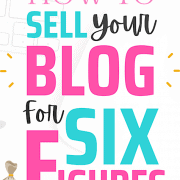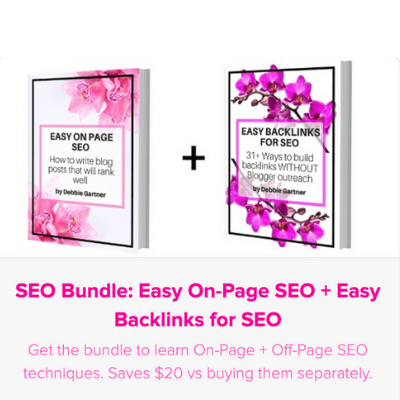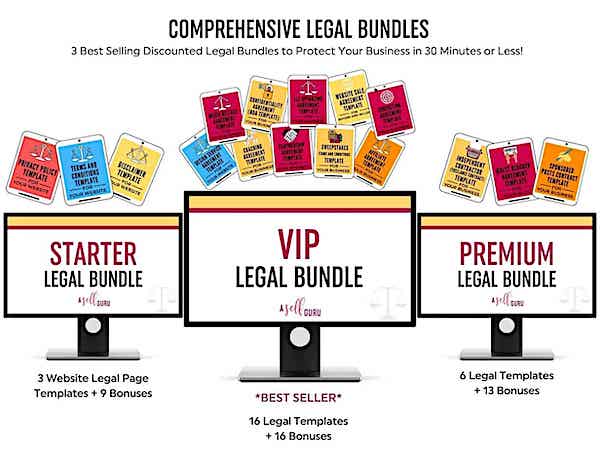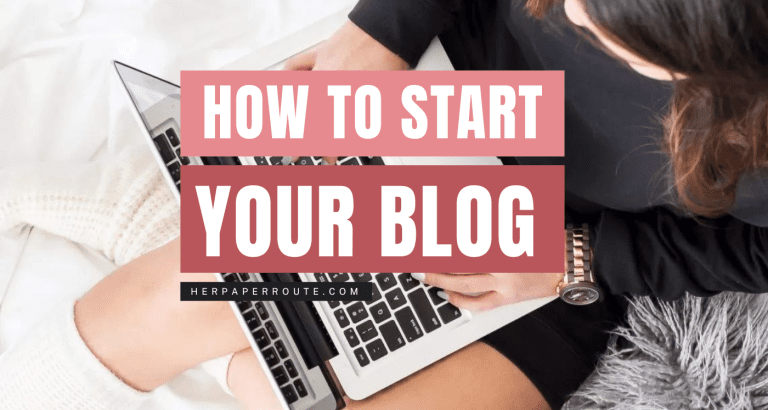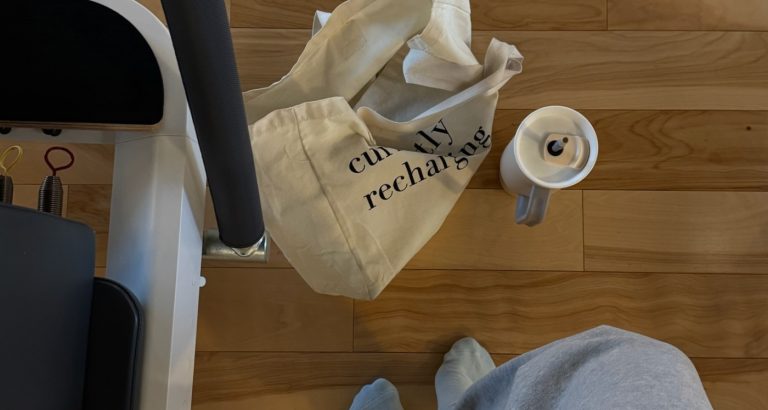Sell Your Blog For 6 Figures, Interview With Tracie Fobes
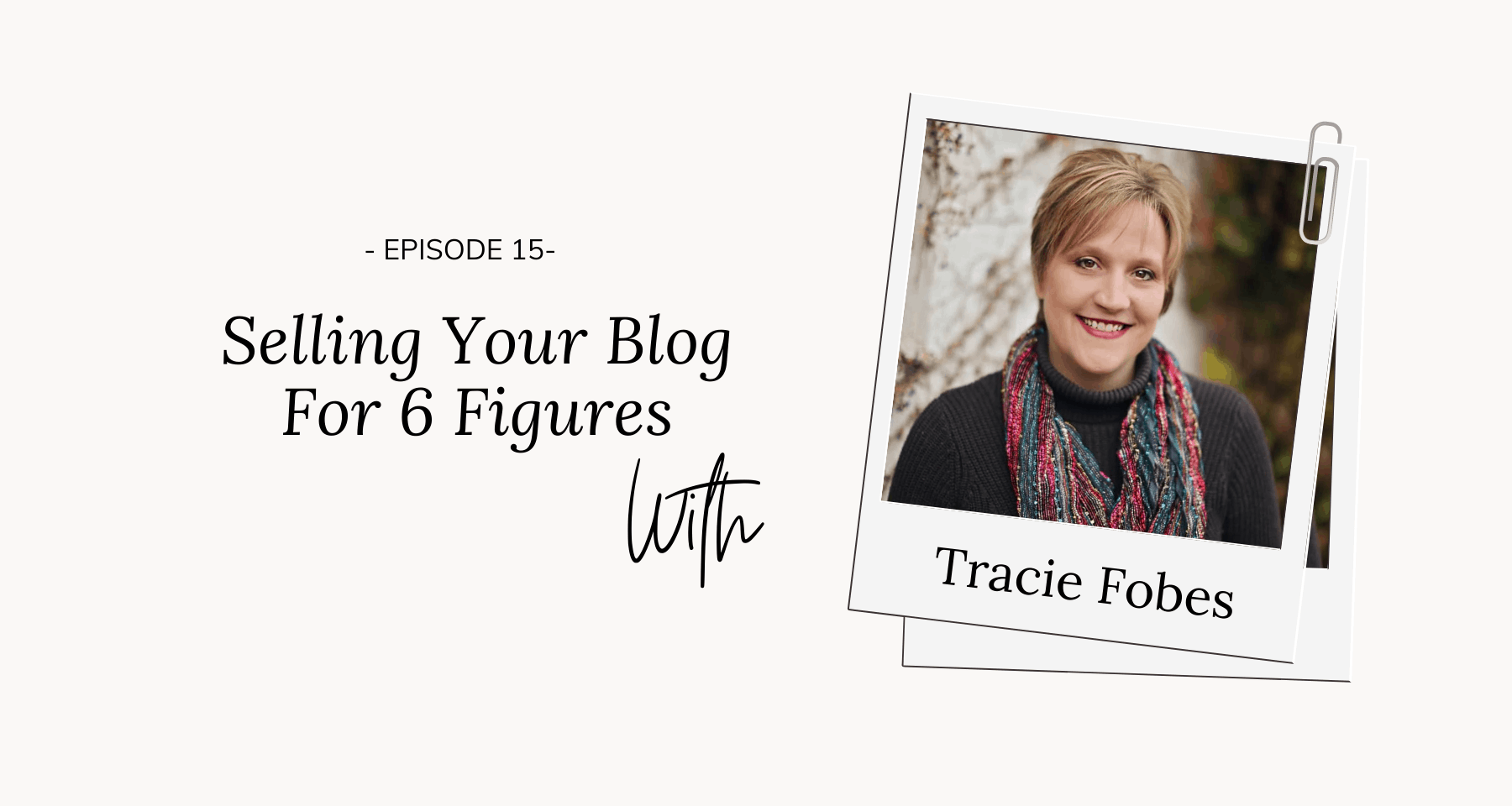
What does it take to sell your blog for 6 figures? Entrepreneur blogger Tracie Fobes is on the podcast today to share her story of what it was like when she sold her blog for more than 100k.
What if you could pay off your debt, pay off your mortgage or even buy a new house, just from selling your blog? That’s exactly what we are talking about in today’s episode.
As an affiliate partner of various brands and sponsored content, HerPaperRoute may earn commission on qualifying purchases. Disclaimer
Get ready to learn about some sides of blogging you may never have even considered before!
Tracie has some extremely helpful tips for growing, scaling and selling websites for high stakes.
How To Sell Your Blog For 6 Figures
Listen to the podcast on Itunes | Google Podcasts | Spotify
Or, Watch The Video
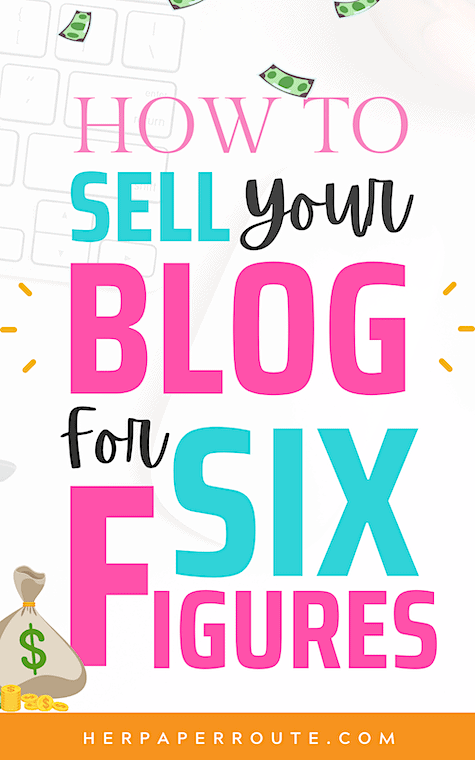
How To Sell Your Blog For 6 Figures With Tracie Fobes
If you have been hanging around my blog or on my list getting my weekly love letter, then you probably know that I am a blog flipper and blog broker.
(Read my Ultimate Guide To Website Flipping!)
I develop and sell monetized websites as a business, and I help other bloggers sell their websites for profit over at Niche Investor
We help content creators at all stages of the blogging game in buying and selling websites.
Honestly, I talk about this business of blog flipping whenever I can to anyone who will listen!
Because not only is it a fun business to be in, but it is also very rewarding financially.
So today I am pumped to get to chat with our guest today, Tracie Fobes. Tracie is a professional blogging entrepreneur who not too long ago sold one of her websites to a private firm for six figures.
She is going to walk us through her experience in selling her blog, and offer up some advice for what you can do to prep your blog for sale so that you can hopefully get a high selling price for your own.
In this episode, we are digging into
- What sort of things you can do to prepare your blog for sale
- What buyers are looking for
- How you can negotiate a high price
- We also discuss the different types of revenue streams that investors want to see most when considering buying a blog
- As well as Tracie’s fantastic tips for how to generate more organic traffic quickly
Related: Is Buying A Blog Worth It?
Resources mentioned
- Get a free website valuation, and view our current listings of websites for sale here.
- Flodesk – Get unlimited email subscribers for life, for $15 per month. That’s the HerPaperRoute discount, 50% off the regular price!
- The project management tool that I use is Honeybook. Get 50% off here and save $280.
- Social media automation tool – Claim your Extended free trial of SmarterQueue here.
- ASelfGuru – Legal contracts and template bundle
- Tracie’s course: Posting Perfection
- Debbie Gartner’s SEO books and SEO Revamp course.
- HerPaperRoute blogging school – see courses here
How To Sell Your Blog For 6 Figures
Q. Chelsea: Welcome to the show, Tracie!
Tracie: Thanks for having me. I’m excited to chat with you today.
Q. I am excited to chat with you. Your name will be a familiar one, I’m sure for many listening, as you are very visible in the blogging world. So please tell us about yourself and what it is that you do here in the blogging community.
I’ve been blogging for more than 11 years now. And so I got into blogging just to kind of help people learn how to budget get out of debt.
Of course, as time went on, people are like, “can you teach me how to do this?”, and I dragged my feet for a very, very long time, because I didn’t think I was qualified enough.
I kept putting it back on the back burner and telling people “No, I just don’t think I have enough experience to do this.” And then finally, I realized why, I am an expert that knows more than somebody who’s blogging for one, or even five years, right?
We’re all experts in our own right, just with different levels of experience.
And finally, after a little prodding, I decided to jump in with both feet.
When I finally told the little imposter syndrome person hanging out in my head to shut up, go away, because I was going to do this.
Since I took control and did that, I can’t believe how great it feels! And now I’m kicking myself wondering why I waited so darn long to just throw caution to the wind and go for it. But it’s all been a blessing.
Nowadays, I absolutely adore helping people start their blog. There is no greater satisfaction than when somebody’s struggling with a problem, and you come in there and you give them the answer.
So that’s what led me down this path, was just people asking me to teach them what I already knew.
Chelsea: Oh, that’s wonderful. I love that! Tracie, you and I have been in the professional blogging game for over a decade. And we’ve seen our fair share of changes in the industry. Something that we will often see over time is that sometimes bloggers burn out, or their passions change. They change their minds about wanting to continue with their blog for whatever reason. But not everyone realizes that selling your blog is an option. You don’t have to let it die! Which you did – you sold your first blog for 6 figures.
Q. What was it like when you sold your blog for 6 figures?
My site was PennyPinchinMom.com. I started it on a whim in January of 2009. And I didn’t really even tell my husband what I was doing because I was really pretty clueless myself.
I didn’t know I could make money blogging. I remember my first check arrived in August of 2009 and it was for $65 and you would have thought I won the dang lottery!
I would feel excited because I thought, “Wow, you can really make money doing this?!”.
So once that happened, I jumped in, I started learning.
But my passion really came from helping the people who were visiting my site. We had just gotten ourselves out of debt. And we had been struggling to make ends meet.
So that’s what I was doing, I was encouraging others saying, “you know, it doesn’t matter how much money you’re making, you can dig yourself out from debt, we’re proof of that.”
Encouragement, support, but it was all around that financial spectrum of helping families live on what they had. And finally, once and for all, eliminate that debt.
The blog grew from there. It just kind of took on a life of its own. And before I knew it, I was pulling it five figures a month, and it was consistent.
Pretty soon people started asking me how to start a blog. But I was like, “Well, I’m not here to teach you how to blog, because that’s not what my site is about. It doesn’t make sense for me to talk about blogging on this website.” I didn’t really pursue it.
The more people kept asking me, I started realizing that I was enjoying that a little more. When I would help people, I was finding a little more satisfaction. So I started a second site, just for blogging tips.
I was burnt out on trying to come up with new content to write about saving money on the first site, and I was just kind of tired of it.
But it was my baby, you know, I couldn’t just give up, I couldn’t just close up shop.
So I was trying to run both for a while. Soon I started seeing more exposure in blog coaching and education.
I started enjoying that much more, to the point where it would feel like a chore working on PennyPinchinMom.com.
I was tired of looking at it. I’d just struggle day in and day out. But again, I couldn’t just close it.
About 18-24 months went by. I casually mentioned to some friends that if they know somebody in the industry looking, I might be willing to sell.
In July of 2019, one of those friends emailed me and said, “Hey, I know a company who was looking at purchasing websites, would you like for me to make an introduction?”
I thought, sure, it was a reputable company in the industry. We had a phone call, I fell in love with them, they fell in love with me and the negotiation started.
By the middle of October, we had a signed contract. That’s where it went. I felt confident letting it go. Because I knew that they had the same objectives for the website.
I just could no longer give it the passion and the love that it needed. So it was really comforting to know that someone else was going to continue that so I can pursue my new passion. And both websites could thrive.
Related: Where to sell your blog
Q. That’s fantastic. What was your blog making in revenue at the time that you sold it?
$200,000 a year is what the blog was making on an annual basis. I sold it in the mid-six figures.
In this case, what was really neat is that we negotiated into the contract that I would write a couple of articles a month as a freelancer.
So I sold my website, and now I’m freelancing back to the website that I originally owned! That’s kind of a crazy thing.
But it kept my voice on there. I’m the voice of the website. So it still keeps me a little in touch with people without me having to do the day-in and day-out maintenance of the website.
At this point, I still am the face of the brand, my photo and name are still on it. That was one of the things we negotiated in the terms, that even if I’m no longer writing, they’ll be able to use my likeness on the website.
So it’s something I think people have to keep in mind.
When you’re letting a site go, just because you’ve got personal content on there doesn’t mean it has to go away, it could be possible that the person or company purchasing would like to retain that personal piece of the blog.
Because that’s kind of what made the blog what it is.
So it’s something you do have to discuss in that negotiation process, whether your content goes away or not.
Sellers may think “I have to get rid of everything personal”, when that really may not be the case. So don’t rush and change everything for prospective buyers. Wait until the buyer and you start talking and then you can figure out what should stay and what should go.
Chelsea: Yes. A lot of companies who are interested in investing in blogs want to keep the face behind the brand. But you don’t have to sell your website with your face, your photos, your name, anything on it, if you don’t want to, these are all things that you work out in your contract.
Q. What sort of revenue streams did that blog focus on?
40% was ad revenue. 35% was affiliate income. Then the rest were my own digital products.
So I had a little bit of diversification between the income sources, which is one of the reasons that the company liked to work with me because it wasn’t all ad revenue.
It wasn’t all just one specific source. There were some different options there.
So it gave them more avenues to pursue when it comes to their own monetization strategy.
Chelsea: Yes, I totally agree, diversify your income and don’t count on one type of revenue stream. Of course, when it comes to selling a website, the more income that it makes generally means the more it can sell for.
Find out how much money your could your blog sell for: How much is your website worth?
Q. What monetization types would you recommend blog sellers focus on?
I probably I would say ad revenue is probably going to be number one, because most companies are going to be looking at getting that organic traffic to the website.
That’s really what they want is the SEO. And honestly, SEO traffic, when it’s from an ad revenue standpoint, is a very high-income earner!
Because those are very targeted users coming for a specific purpose.
So the ad companies will often pay more for that specific type of traffic compared to traffic from Pinterest.
Ad revenue is really number one, and then your affiliate partnerships as well. I would definitely boost affiliate income up because you know, ad revenue comes and goes, but you want to convert on that traffic that’s visiting.
So yes, we can get them there through search. But we really would like for them to do something once they get there.
We would like for them to be clicking on our affiliate links and making purchases, signing up for our email list.
If you’re really going to focus on something, I would focus not on your products at this point, I would focus more on that ad revenue and that affiliate income and try to hit that 50/50 mix if possible.
Just again, so you have a nice showcase to say “hey, yeah, we’re not making 90% of our income from ads, or just 90% from affiliates.”
Because that’s a little scary for anybody willing to make an investment when you have all of your eggs so highly invested in just one basket.
Q. Tracie, do you have any tips for how bloggers can generate more organic traffic to their site quickly to increase the likelihood of finding a buyer?
Absolutely. You want to make sure that your site is Google-friendly. Number one, that means it needs to load quickly.
You know, get rid of the stuff that slows it down. You are going to want to make sure it can be read on all devices.
One common mistake I see for a lot of people make is that their font is too small.
Google hates small font, they do not want people having to pinch in on large to read.
Next, you want to make sure that your links are obvious. Don’t hide your links, don’t make them the same color as your font, don’t make them too light.
We want those links to stand out.
Because then when people are finally landing on your site, they can click, y
Next, you need to make sure the structure of your site is set up properly. Silo your content! This means that the content all works together. Kind of like a grain silo on a farm. Your content all works together and has a unified purpose.
So for example, if you’re a lifestyle blog and your contents all over the place, that’s a little more difficult.
Because it’s so much harder to get that organic traffic, because Google doesn’t really know what your authority is on any one topic.
So we want to make sure that we can have that authority by properly establishing our site and our content around one specific audience or one specific purpose or goal.
Those are big things that I see that bloggers are not doing when it comes to SEO.
But I think the biggest one is not being willing to make an investment in your education.
There is so much to learn about SEO. Sure, you can learn some things from free content. It’s great. I love things that are free, but it only takes you so far.
Make an investment in your business to learn SEO. This together makes your blog so much more marketable to a potential buyer.
You’ll be able to say, “look, we’ve been working on SEO, we’ve done this, this is how we’ve improved our traffic.” And the buyer is going to see the potential there.
If you’re not getting any organic traffic, how do they know what kind of growth opportunities lie ahead of them?
Or is everything stagnant? Have you tried anything?
So it’s just much more appealing from a buyer’s perspective, that they can see that growth and those opportunities where your potential SEO lies.
I have invested in Mike Pearson’s Stupid Simple SEO, probably one of the best investments I have made for my site. It’s so well explained.
Also, Debbie Gardner has some great books. One of them is called Easy Backlinks, where she walks you through how to get quality backlinks.
Which are extremely vital to good SEO. She’s got a wonderful book on how to get your site set up for Google for SEO.
These are the tools that I have personally used that I have found great value in.
Mike’s was a little more expensive, but it still was not so expensive that it was out of the realm of what I’m willing to pay. I am willing to invest in my education, but I also don’t want to drop two or $3,000 on a course necessarily. His was still very affordable.
Again, it just I can’t say enough good things about it. I feel that he breaks it down in a way that makes sense because he’s a blogger too.
So he’s not speaking over my head, he’s not talking at me. He’s helping me and he shows me literally step-by-step exactly what I have to do.
You just can’t even really put a price on that type of education.
Q. Now it’s time for a blogger to prepare their website for sale. What should they be focusing on, for the new owner to take it over?
Alright, so you want to do some back-end prep. A new owner is going to want to have financials for the past two to three years.
You need to have your financial statements ready. You will need to have your profit and loss sheet ready. As well, tax returns, any legal contracts or documents, any trademarks.
Get A Fillable Profit & Loss sheet, for free:
The other thing that I tell people to do is just to clean up some of the little stuff.
We always have those few little projects we haven’t done or maybe the few posts that need a little bit of tweaking.
So that your blog presents itself in the best possible way.
You also need to start thinking about what price you are willing to sell for. You might think it’s worth $100 million, but it’s really not!
We need to do some analysis and put for some education and pull together accurate stats.
Get a free website valuation to find out an accurate selling price range.
So when someone approaches you to buy, you can have a reasonable offer that you know you can live with, that they would be willing to accept.
One that really makes sense for your site, the content, and the revenue. It’s based on current revenue, as well as potential revenue opportunities.
Q. When you were selling your site, did you have a lot of back and forth negotiating?
Our negotiation process was really pretty simple. They sent me their offer. I saw what it was, and my husband and I talked it over.
I countered with another offer, and changed a couple of the terms in the contract. They came back and said, “Well, we would like to keep it at this, but we can agree to these other terms.”
That was acceptable to us. And we were done!
So in our case, it was literally like what, two, three emails, and we were finished.
But I also knew how much that I wanted to get for it. I knew my bottom line. Yet, I was in this situation that it was time to let it go.
I didn’t want to keep the process going forever and ever. I didn’t know when the next offer will come along.
This offer was pretty much right in line with what I knew it was worth, what I was happy to accept.
I felt it was time to just go ahead and let it go for that price.
But you do have to be comfortable with the amount that they’re offering to you, because you don’t want to have regrets that you undersold yourself.
Q. On that note looking back now, is there anything that you would have done differently?
You know, I don’t think so. I think everything went so well.
As soon as we got through that contract and the negotiation on the asking price, they sent everything over.
Really the longest part was waiting for my attorney to review the sale contract. I
think that’s one thing a lot of people forget when you get a contract. Never Ever, ever, ever, ever just signed it and send it back!
You absolutely need to invest in a good corporate attorney to review any contracts, to make sure your interests are at heart.
Because the person who’s buying, if they are the ones providing their own sale contract, they’re protecting themselves, not you.
If you are using a website broker to represent you, your broker will provide a sale contract for you and the buyer, which protects you as a seller, and ensures that you are aren’t selling for less that your website is worth. Always have your attorney review any contracts you enter into, still!
We told the buyers that our attorney was reviewing it, and they were happy to hear that. So that made me felt good.
If you have a buyer who questions that you’re wanting your attorney to look at the contract, I would probably be pretty tempted to want to run the other way.
A good buyer realizes that the contract is the crux of the whole thing.
You have to have somebody review that. Not wanting somebody to review it makes me think that they’re trying to be sneaky, or backhanded. And maybe slid in some wording that really benefits them more than me.
Or is taking advantage of me and my lack of understanding of legal terminology.
So make sure that you invest in an attorney. It’s going to cost you, but you’re selling your site anyway.
So just look at paying for the attorney as just part of the cost of selling your site.
Related: The legal templates every blogger needs
Q. When you reached a deal, what was the process like of transferring the website and all of the assets over to the buyer?
It wasn’t as bad as I thought! You know, after 11 years of blogging, you can imagine just how many affiliate partners I had.
And all logins! So I set up a Slack channel with the buyers.
That way, we had a great line of communication back and forth.
They created a Google spreadsheet, and I filled it out. I updated every password to be something that was more generic.
You should go into every application, program, tool you use and you create a more secure password that you can hand over to them.
I gave them access to Google Analytics, so they could take over that account. I gave them access to search console so they could take over that account.
There’s so many moving pieces and parts.
You want to make sure that you think about everything you touch every day and add that to a sheet.
So as you get ready to go through that process, start a spreadsheet for all of your log ins.
So at the point, you’re ready to hand that over to the new buyer, you’ve got a great list of everything they’re going to need to access. Because there’s a lot more to it than I think we all even realize on a day to day basis.
Q. Have you sold any other blog since?
No, but I have thought about starting a couple of niche sites and potentially building them up and trying to sell them.
If potentially do that in the future, I will make sure I’m at a point where I can bring in a blog manager.
So I can just have somebody else run the sites for me. I’d pay them so they can handle that day-to-day stuff.
But for right now, I am very, very content just being in the blogging education and coaching sphere.
Q. Any blogging productivity tips you can share?
My favorite tip is, each Sunday night, I sit down with my planner, and I determine what I want to work on this week.
But I and I break it up by tasks each day. If I’m working on a new course. Well, my to-do list isn’t just ‘work on the course’, mine is ‘work on module one today’.
So I take what I want to work on, and I break it up into daily tasks.
That’s what goes on my to-do list. That is all my objective is for the day.
If that’s all I get done that day, it was a successful day.
If I get that done, and I have more time to focus, maybe working ahead to the next day, I will.
But I find when I can break every task up into one small daily task, I’ll feel much more accomplished.
By day five, I got a lot done.
I don’t over-book my weeks. If something new comes up, unless it’s an emergency, it does not go on this week’s schedule. It goes on next week’s schedule.
So that way I’m not jumping from project to project and not suffering from squirrel syndrome, you know, where your head is jerking from thing to thing, without getting anything done.
But my biggest tip, honestly, is when I’m working on something, I literally shut everything down.
Social media, my inbox, everything. I simply focus on what my task is.
If that means that I work on it for four hours and I don’t look at another thing, great.
The world’s not coming to an end if I don’t check my inbox. It’s going to be okay if I don’t respond to somebody on Facebook three seconds after they leave a question.
Everybody will live. This is how I can focus 100% of my time. Once I am caught up, I’ll go check everything else and go about my day.
Q. What are you working on now?
Right now I’m working on a new, super cheap course. Not cheap as in quality, but just affordable.
It’s called Posting Perfection, all about how to write epic blog content. It’s only $19!
I find that new bloggers don’t know how to keyword research. They don’t know the correct blog post structure.
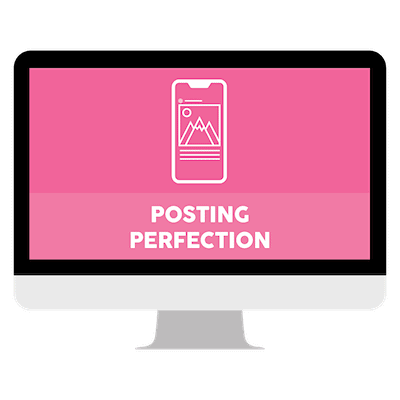
They don’t know all the different pieces that help us, experts, write a really good blog post that ranks.
I would rather help the new blogger set themselves up for success right from the start writing that epic content that’s going to solve those problems, and potentially rank on Google.
How To Sell Your Blog For 6 Figures With Tracie Fobes – Related
- How I Sold My Blog For $50,000 – Flipping Blogs For Profit
- How To Start A Blog And Make Money Blogging
- How To Make Money Blogging Actually!
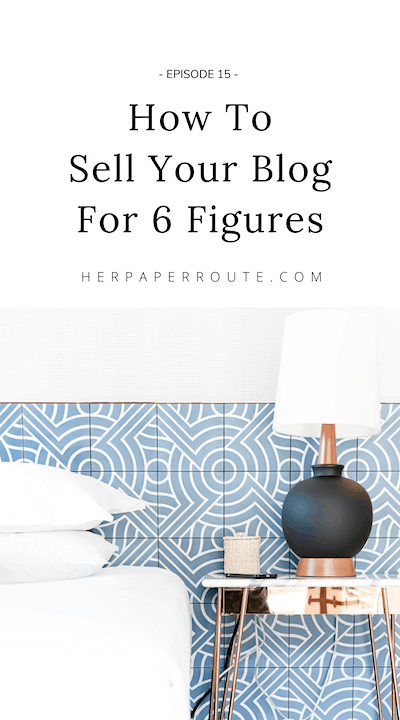
Follow along on Instagram!


